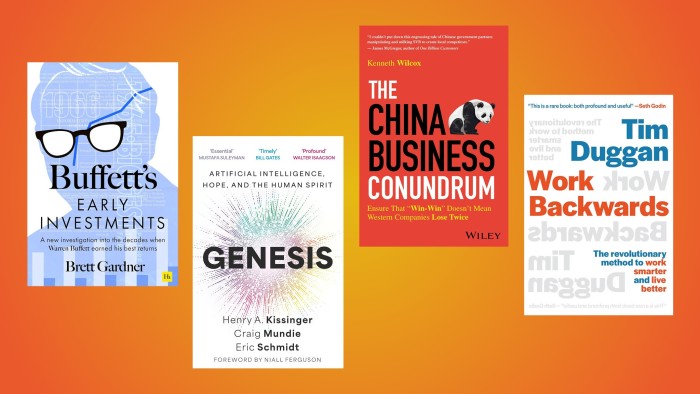‘Genesis: Artificial Intelligence, Hope, and the Human Spirit,’ by Henry Kissinger, Craig Mundie and Eric Schmidt
What does ChatGPT have in common with Anglo-Irish explorer Ernest Shackleton’s (unsuccessful) mission to reach the South Pole? Both, according to Genesis, are symptoms of the same innate human drive for exploration — as well as a healthy appetite for risk.
The last of 20 books by Henry Kissinger, who died at 100 last November, Genesis is the veteran diplomat’s second attempt to examine the impact of advances in AI. The first, The Age of AI, presented the technology as humanity’s biggest foe yet. Genesis, co-authored with technology business leaders Eric Schmidt and Craig Mundie, is no less emphatic about the seismic shifts ahead, but leaves more room for optimism.
The book leans on references to everything from Greek and Norse mythology to Disney’s Aladdin in its attempt to investigate how human societies will be shaped by our first interaction with a superior intelligence.
Making the case that the benefits of technological exploration still outweigh the risks, Genesis is perhaps most compelling when drawing on Kissinger’s personal expertise to suggest AI “could transcend the rather mixed track record of human diplomacy”.
Kissinger and his co-authors argue humanity’s survival will ultimately hinge on our ability “to assert more clearly what it is that distinguishes us from machines”. Their book, perhaps inevitably, has more questions than answers on this topic. Stephanie Stacey
‘Work Backwards — the revolutionary method to work smarter and live better,’ by Tim Duggan
“In the future, we’ll work a little and be completely fulfilled because we’re living out our purpose every single day. Sound amazing? Well, it’s all crap.”
That’s according to Tim Duggan, a self-proclaimed optimist best known for co-founding Australian independent publishing platform Junkee Media. Duggan says there’s no “silver bullet” that will transform our working lives. “The future of work is doing the work, thinking deeply about who you are and then testing, experimenting, iterating and repeating until it slowly gets better,” he says.
As the title of Duggan’s third book — preceded by Killer Thinking and Cult Status — suggests, we should work backwards by identifying the lifestyle to which we aspire, pinpointing the income that lifestyle would require, and building our working lives around it.
To help us answer the all-consuming question “what do I want from life”, Duggan, who is also a former Rolling Stone journalist, outlines his MAP framework, interrogating where we find meaning in our work, and identifying our anchors and priorities.
Similar to our values, our anchors motivate us beyond a salary. Duggan rejects “the antiquated idea” of a separate work and personal self, and advises that we try to “fully understand” our motivations. Leah Quinn
‘Buffett’s Early Investments: A new investigation into the decades when Warren Buffett earned his best returns,’ by Brett Gardner
Investing has been at the heart of any financial planning for centuries. While modern technology now drives much of the process, timeless lessons from the past continue to offer guidance.
In his debut book, investor Brett Gardner provides an investigative analysis of Warren Buffett‘s investments made in the 1950s and 1960s, revealing how the chair and CEO of Berkshire Hathaway became one of the world’s most respected investors.
The author dives deep into the formative years of Buffett’s career, examining the key factors that contributed to his success. Gardner reveals Buffett’s strategies, illustrating his focus on value and thorough analysis, which enabled him to outperform the market.
The book’s unique value lies in its case studies of pivotal investments that shaped Buffett’s principles, including in companies such as American Express and Walt Disney. Gardner’s research unpacks Buffett’s approach, showing how he went beyond traditional metrics, looking for qualitative elements in a business — such as brand strength and market positioning — long before these became standard considerations in value investing.
Across 10 chapters, the book serves as a blueprint for thoughtful investing and the benefits of long-term vision. It gives readers a deep look at how dedication, strategic insight, and an eye for quality can drive exceptional investment results. Leo Cremonezi
‘The China business conundrum: ensure that win-win doesn’t mean western companies lose twice,’ by Ken Wilcox
The collapse and fire sale of Silicon Valley Bank dominated headlines across the US last year, but less discussed was the gradual winding down of its China venture, an equally fascinating story.
Ken Wilcox’s new book, The China Business Conundrum, tells the little-known story of SVB’s ambitious expansion in China, spurred by a sense of Fomo: “If we don’t follow our venture capital friends across the ocean into these markets . . . we’ll miss the big opportunity,” writes the former chair of SVB and former president of its Chinese operation.
But, once in the market itself, a complex web of “guanxi” and the Chinese government’s dominant role in business proved far beyond Wilcox’s imagination. After years of navigating licensing delays and delicate dances with local bureaucracy, the author concluded that any attempt to transplant SVB’s original model on to Chinese soil was doomed to fail.
Ignorance or unpreparedness may have contributed to the venture’s struggles, Wilcox recalls. Yet what ultimately shaped its fate was, in his view, China’s intent from the start: instead of seeking a straightforward business partnership, the goal appeared to be a calculated move to absorb and replicate its business model within its own banking sector.
The kind of tech financing promoted by SVB failed to flourish in China to date, and the author’s story mirrors a broader frustration of foreign businesses operating there. Full of rare insights, this memoir is a valuable guide as the world faces increasing business turbulence when engaging with China — especially under a Donald Trump comeback. Cheng Leng
Read the full article here

